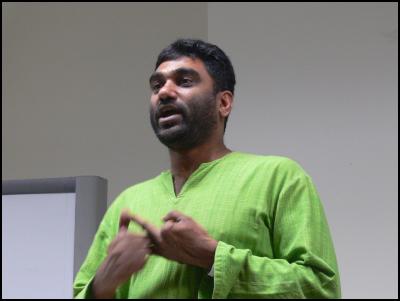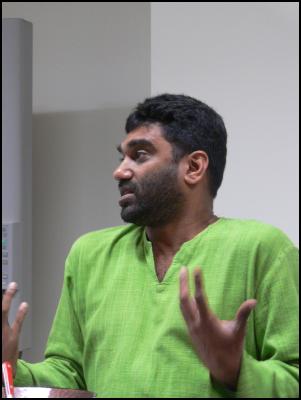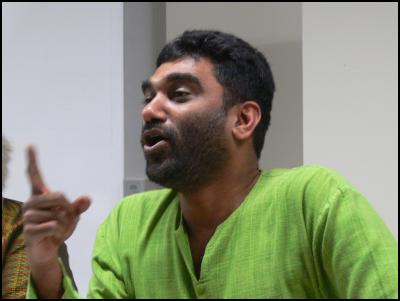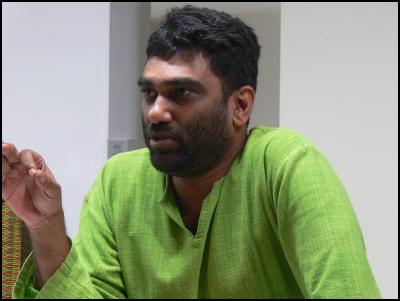Audio: Dr Kumi Naidoo Criticises NZ "Terror" Laws
Scoop Audio + Images: Renowned International Civil Society Activist Criticises NZ's Terror Laws
By Spike Mountjoy

Click for big version
A visiting anti-poverty campaigner and veteran of South Africa's anti-apartheid movement says New Zealand's anti-terrorism laws would never pass in his country because they would breach the constitution.
Speaking in Wellington on Monday, Dr Kumi Naidoo, Chief Executive of CIVICUS, a global umbrella group of 500 civic action groups, says the world-wide reaction to the 2001 terrorist attacks on the US has been predictably tragic.
“A few days after 9-11 we issued a statement to the leaders of the world saying ‘don't undermine the rule of law, don't act in anger, and don't act in revenge because if you do that you're going to make it worse’.”
Naidoo says activists all around the world are now feeling the chilling effects of laws introduced in the wake of the September 11 attacks.
He says he explained this to former US Attorney General John Ashcroft, with whom he recently shared a forum discussing the "War on Terror".
“You can't say the war on terrorism is supposed to defend our civilisation and our culture and so on, and then in the process of so-called defending our way of life, start decimating all the things that are dear, not respecting the rule of law, detaining people without trial, religious profiling, invading people's privacy and so on. What exactly are you defending?"
Naidoo says most countries passed counter-terrorism legislation after 9-11, but many of those countries are now reviewing the more contentious elements of their laws.
“You all need to challenge your government to be consistent in the way that they act on these issues, and I think when they overreact they undermine the notion of the rule of law. And the last thing you want is for people - particularly from socially excluded groups and historically oppressed groups - to feel that they can’t trust the law because that is the worst outcome in terms of undermining democracy overall.”
Naidoo is also the chair of Global Call to Action Against Poverty, a group calling for trade justice and debt cancellation for developing countries.
“If you think security is just national security in the way we understand it, military, police, surveillance and so on, you're never going to actually create real security, because if you don't link that to the notion of human security more broadly . . . as a friend of mine in Thailand says, ‘Millions of hungry stomachs are collectively a weapon of mass destruction too’.”

Click for big version
Listen to the audio below of Kumi Naidoo's address in Wellington.
- Kumi Naidoo's full 1hr 20m speech: The Make Poverty History campaign, the Millennium Development Goals, and political responses to the 2001 US terror attacks, among other things.
- Kumi Naidoo excerpt: On civil action groups' struggle to engage the media.
DOWNLOAD MP3

Click for big version
- Kumi Naidoo excerpt: On terror legislation.
DOWNLOAD MP3
Background on Dr Kumi Naidoo Courtesy of the Council for International Development of Aotearoa/New Zealand

Click for big version
Kumi Naidoo was born in South Africa and was actively involved in the struggle against apartheid from the age of 15. In 1986, Kumi was arrested and charged for violating the state of emergency regulations in South Africa. Upon his release from prison, Kumi was subject to persistent police harassment and went underground for one year before living in exile in England until 1989. During this time, Kumi was a Rhodes Scholar at Oxford University and earned a doctorate in political sociology.
After Nelson Mandela's release from prison in 1990, Kumi returned to South Africa and has worked on a wide range of issues including the legalization of the African National Congress (ANC) as a political party and acting as official spokesperson of the Independent Electoral Commission. Kumi also organised the National Men's March Against Violence on Women and Children in 1997.
Kumi was the first civil society leader to be invited to give the World Bank Presidential Fellows Lecture in 2003 and was recently appointed by the U.N. Secretary-General Kofi Annan to the eminent Persons Group on United Nations-Civil Society Relations chaired by former Brazilian President Fernando Cardoso.


 DC Harding: In The Spirit Of Natural Justice
DC Harding: In The Spirit Of Natural Justice Martin LeFevre - Meditations: Animal Encounters During Meditative States
Martin LeFevre - Meditations: Animal Encounters During Meditative States Ian Powell: Gisborne Hospital Senior Doctors Strike Highlights Important Health System Issues
Ian Powell: Gisborne Hospital Senior Doctors Strike Highlights Important Health System Issues Keith Rankin: Who, Neither Politician Nor Monarch, Executed 100,000 Civilians In A Single Night?
Keith Rankin: Who, Neither Politician Nor Monarch, Executed 100,000 Civilians In A Single Night? Eugene Doyle: Writing In The Time Of Genocide
Eugene Doyle: Writing In The Time Of Genocide Gordon Campbell: On Wealth Taxes And Capital Flight
Gordon Campbell: On Wealth Taxes And Capital Flight